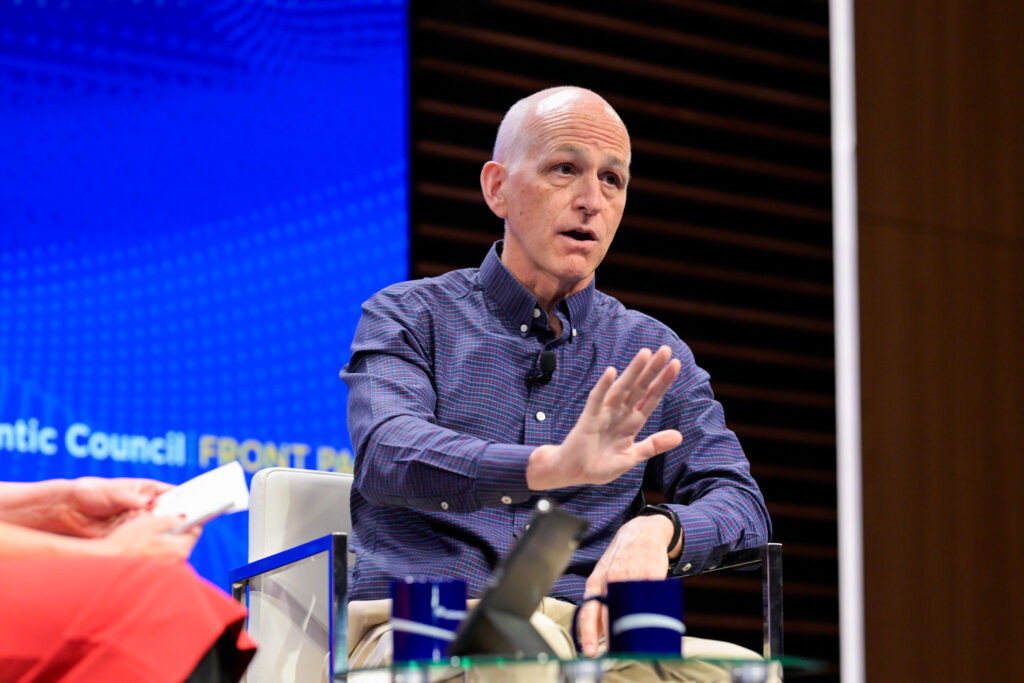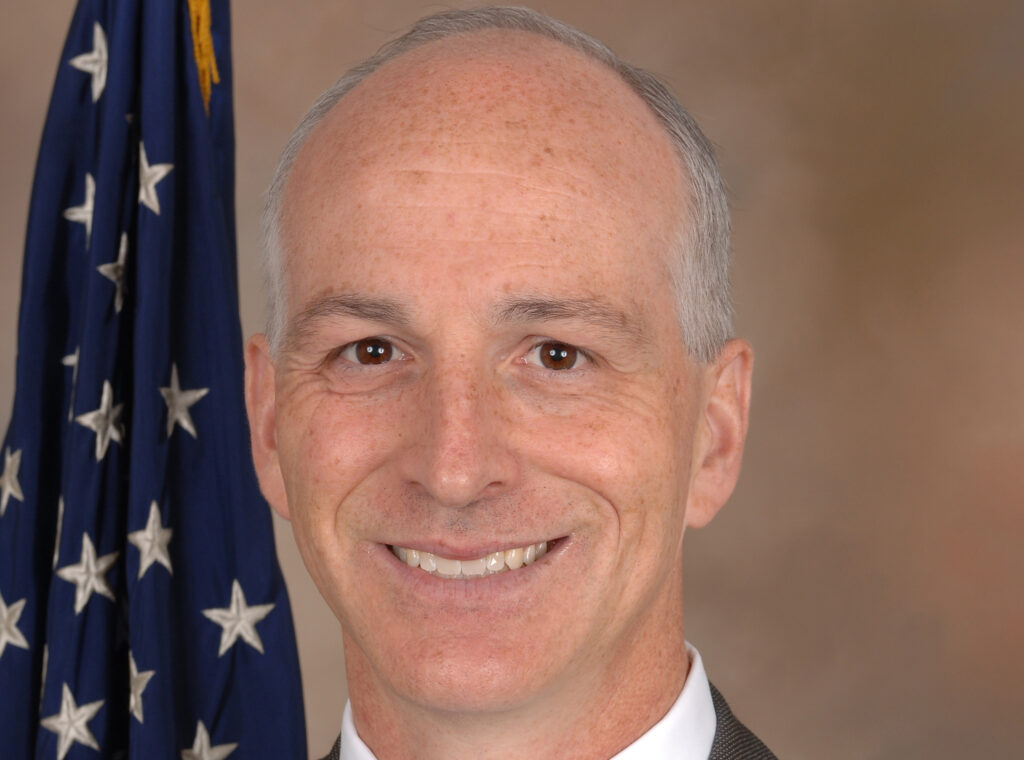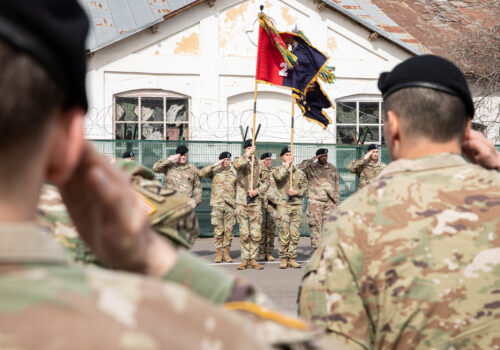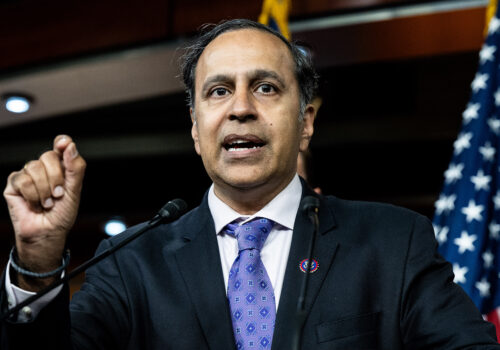Watch the event
“I don’t think simply committing this large number of assets—hundreds of millions, probably billions of dollars by the time it’s done—to blow up some drug boats in international waters in Latin America is going to make an appreciable difference” in the fight against drug trafficking, said Representative Adam Smith (D-WA), the ranking member of the House Armed Services Committee, at an Atlantic Council Front Page event on Thursday.
The event, part of the Atlantic Council’s Commanders Series, came amid uncertainty over whether the Trump administration’s campaign of attacks on boats that it claims are trafficking drugs will escalate into an effort to overthrow Venezuelan autocrat Nicolás Maduro.
Based on a briefing he received from the State Department and Department of Defense on Wednesday, Smith said he thinks that “the administration does not want to go to war with Venezuela.” But, Smith added, US President Donald Trump sometimes “very quickly” changes his mind. “So who knows?”
Thursday’s event also came amid the longest US government shutdown in history, with the House out of session even as the National Defense Authorization Act (NDAA) for the next fiscal year has yet to be passed, a situation Smith called “unbelievably disruptive.”
Read below for more highlights from this conversation with Smith, which was moderated by Fox News Chief National Security Correspondent Jennifer Griffin.
The NDAA
- “The NDAA itself is moving forward,” Smith said of the annual bill, noting that different versions have been passed by the House of Representatives and the Senate, and now the two versions need to be reconciled.
- One of Smith’s priorities for the bill is acquisition reform: “My position is we’ve had the risk wrong for a long time” on defense acquisition policy, said Smith. “We’ve been only focused” on the risk of corruption in the procurement process “as opposed to the risk of not moving fast enough,” he said. One way to speed up acquisition, he said, is “consolidating the decision makers” in the process “instead of having to go through nine or ten different layers.”
- Smith also said he wants to “have procurement people stay in their job longer.” Constant turnover in procurement roles, he said, “doesn’t really help with corruption. It just means that the person doesn’t know the system as well when they’re working on it.”
US strikes on boats in the Caribbean and Pacific
- Transnational drug-trafficking gangs in the Western Hemisphere are “a problem for our national security” and “a problem for Latin America,” Smith said. “You’ve got budding narco-states down there. They’re having a harder and harder time dealing with that. We need to be engaged and involved in that.”
- However, Smith was critical of the Trump administration’s campaign of attacks on alleged drug-trafficking boats in the Caribbean and the Pacific. “It seems very problematic to me that we have decided that drug dealing will now have the death penalty attached to it,” with “no process whatsoever.”
- “They’re certainly bad policy in my view,” Smith said of the strikes.
US military presence abroad
- “I think one of the mistakes that we have made is to assume that our global presence is just a cost that isn’t benefiting us,” Smith said of US troop deployments abroad.
- Citing threats posed by Russia, China, Iran, North Korea, and transnational terrorist organizations, Smith said that to pull US troops back from allied countries now and “ignore” these dangers “places us at risk.”
- Smith took issue with the Trump administration’s decision to draw down its forces in Romania and noted that there is “bipartisan, bicameral support” in the House and Senate armed services committees “to maintain our presence in Europe and defend them.”
- “If any of you have been to Romania, the Baltics, Poland,” said Smith, addressing the crowd, “they want a lot of things, but the one thing they want more than anything is us,” meaning a US military presence. “They don’t believe Russia wants to come in and kill a bunch of US troops. So a little bit of presence can give us a maximum amount of deterrence, and we’re going to fight that out in the defense bill.”
Daniel Hojnacki is an assistant editor on the editorial team at the Atlantic Council.
Watch the event
Further reading
Thu, Nov 6, 2025
The expert conversation: What’s Trump’s endgame in Venezuela?
New Atlanticist By Matthew Kroenig, Jason Marczak
We spoke to Matthew Kroenig and Jason Marczak to shed light on the US campaign of attacks on alleged drug boats and lay out what's next.
Thu, Oct 30, 2025
What does the US drawdown in Romania mean for European defense?
New Atlanticist By
The drawdown marks the first officially announced step of the Trump administration’s planned pullback of its European force presence.
Wed, Oct 29, 2025
US Congressman Raja Krishnamoorthi on the three wins Trump can secure from his meeting with Xi
New Atlanticist By Katherine Golden
Speaking at an Atlantic Council Front Page event, the congressman said that he hoped Trump would "show strength" at the meeting with China's president.
Image: Representative Adam Smith (D-WA) speaks at an Atlantic Council Front Page event on November 6, 2025.




